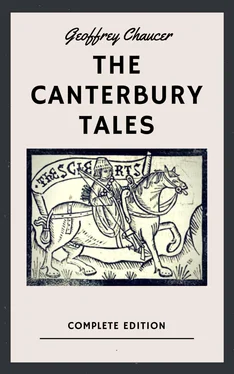That found his master well in his chaffare,* *merchandise
For oftentime he found his box full bare.
For, soothely, a prentice revellour,
That haunteth dice, riot, and paramour,
His master shall it in his shop abie*, *suffer for
All* have he no part of the minstrelsy. *although
For theft and riot they be convertible,
All can they play on *gitern or ribible.* *guitar or rebeck*
Revel and truth, as in a low degree,
They be full wroth* all day, as men may see. *at variance
This jolly prentice with his master bode,
Till he was nigh out of his prenticehood,
All were he snubbed* both early and late, *rebuked
And sometimes led with revel to Newgate.
But at the last his master him bethought,
Upon a day when he his paper<2> sought,
Of a proverb, that saith this same word;
Better is rotten apple out of hoard,
Than that it should rot all the remenant:
So fares it by a riotous servant;
It is well lesse harm to let him pace*, *pass, go
Than he shend* all the servants in the place. *corrupt
Therefore his master gave him a quittance,
And bade him go, with sorrow and mischance.
And thus this jolly prentice had his leve*: *desire
Now let him riot all the night, or leave*. *refrain
And, for there is no thief without a louke,<3>
That helpeth him to wasten and to souk* *spend
Of that he bribe* can, or borrow may, *steal
Anon he sent his bed and his array
Unto a compere* of his owen sort, *comrade
That loved dice, and riot, and disport;
And had a wife, that held *for countenance* *for appearances*
A shop, and swived* for her sustenance. *prostituted herself
. . . . . . . <4>
Notes to the Cook's Tale
1. Cheapside, where jousts were sometimes held, and which was the great scene of city revels and processions.
2. His paper: his certificate of completion of his apprenticeship.
3. Louke: The precise meaning of the word is unknown, but it is doubtless included in the cant term "pal".
4. The Cook's Tale is unfinished in all the manuscripts; but in some, of minor authority, the Cook is made to break off his tale, because "it is so foul," and to tell the story of Gamelyn, on which Shakespeare's "As You Like It" is founded. The story is not Chaucer's, and is different in metre, and inferior in composition to the Tales. It is supposed that Chaucer expunged the Cook's Tale for the same reason that made him on his death- bed lament that he had written so much "ribaldry."
THE MAN OF LAW'S TALE.
THE PROLOGUE.
Our Hoste saw well that the brighte sun
Th' arc of his artificial day had run
The fourthe part, and half an houre more;
And, though he were not deep expert in lore,
He wist it was the eight-and-twenty day
Of April, that is messenger to May;
And saw well that the shadow of every tree
Was in its length of the same quantity
That was the body erect that caused it;
And therefore by the shadow he took his wit*, *knowledge
That Phoebus, which that shone so clear and bright,
Degrees was five-and-forty clomb on height;
And for that day, as in that latitude,
It was ten of the clock, he gan conclude;
And suddenly he plight* his horse about. *pulled <1>
"Lordings," quoth he, "I warn you all this rout*, *company
The fourthe partie of this day is gone.
Now for the love of God and of Saint John
Lose no time, as farforth as ye may.
Lordings, the time wasteth night and day,
And steals from us, what privily sleeping,
And what through negligence in our waking,
As doth the stream, that turneth never again,
Descending from the mountain to the plain.
Well might Senec, and many a philosopher,
Bewaile time more than gold in coffer.
For loss of chattels may recover'd be,
But loss of time shendeth* us, quoth he. *destroys
It will not come again, withoute dread,*
No more than will Malkin's maidenhead,<2>
When she hath lost it in her wantonness.
Let us not moulde thus in idleness.
"Sir Man of Law," quoth he, "so have ye bliss,
Tell us a tale anon, as forword* is. *the bargain
Ye be submitted through your free assent
To stand in this case at my judgement.
Acquit you now, and *holde your behest*; *keep your promise*
Then have ye done your devoir* at the least." *duty
"Hoste," quoth he, "de par dieux jeo asente; <3>
To breake forword is not mine intent.
Behest is debt, and I would hold it fain,
All my behest; I can no better sayn.
For such law as a man gives another wight,
He should himselfe usen it by right.
Thus will our text: but natheless certain
I can right now no thrifty* tale sayn, *worthy
But Chaucer (though he *can but lewedly* *knows but imperfectly*
On metres and on rhyming craftily)
Hath said them, in such English as he can,
Of olde time, as knoweth many a man.
And if he have not said them, leve* brother, *dear
In one book, he hath said them in another
For he hath told of lovers up and down,
More than Ovide made of mentioun
In his Epistolae, that be full old.
Why should I telle them, since they he told?
In youth he made of Ceyx and Alcyon,<4>
And since then he hath spoke of every one
These noble wives, and these lovers eke.
Whoso that will his large volume seek
Called the Saintes' Legend of Cupid:<5>
There may he see the large woundes wide
Of Lucrece, and of Babylon Thisbe;
The sword of Dido for the false Enee;
The tree of Phillis for her Demophon;
The plaint of Diane, and of Hermion,
Of Ariadne, and Hypsipile;
The barren isle standing in the sea;
The drown'd Leander for his fair Hero;
The teares of Helene, and eke the woe
Of Briseis, and Laodamia;
The cruelty of thee, Queen Medea,
Thy little children hanging by the halse*, *neck
For thy Jason, that was of love so false.
Hypermnestra, Penelop', Alcest',
Your wifehood he commendeth with the best.
But certainly no worde writeth he
Of *thilke wick'* example of Canace, *that wicked*
That loved her own brother sinfully;
(Of all such cursed stories I say, Fy),
Or else of Tyrius Apollonius,
How that the cursed king Antiochus
Bereft his daughter of her maidenhead;
That is so horrible a tale to read,
When he her threw upon the pavement.
And therefore he, *of full avisement*, *deliberately, advisedly*
Would never write in none of his sermons
Of such unkind* abominations; *unnatural
Nor I will none rehearse, if that I may.
But of my tale how shall I do this day?
Me were loth to be liken'd doubteless
To Muses, that men call Pierides<6>
(Metamorphoseos <7> wot what I mean),
But natheless I recke not a bean,
Though I come after him with hawebake*; *lout <8>
I speak in prose, and let him rhymes make."
And with that word, he with a sober cheer
Began his tale, and said as ye shall hear.
Notes to the Prologue to The Man of Law's Tale
1. Plight: pulled; the word is an obsolete past tense from "pluck."
2. No more than will Malkin's maidenhead: a proverbial saying; which, however, had obtained fresh point from the Reeve's Tale, to which the host doubtless refers.
3. De par dieux jeo asente: "by God, I agree". It is characteristic that the somewhat pompous Sergeant of Law should couch his assent in the semi-barbarous French, then familiar in law procedure.
4. Ceyx and Alcyon: Chaucer treats of these in the introduction to the poem called "The Book of the Duchess." It relates to the death of Blanche, wife of John of Gaunt, Duke of Lancaster, the poet's patron, and afterwards his connexion by marriage.
Читать дальше












